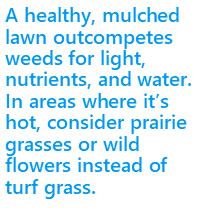The Perfect Lawn
You can create a beautiful outdoor space and protect our waters.
A gorgeous home landscape doesn’t need to come at the price of clean lakes and streams. We can have both. But to make it happen, we all need to think a little differently. Read these tips. Post this sheet in your garage near the lawnmower and garden tools. This will help us change one habit at a time, so we have good fishing, swimming, paddling and water-skiing when the work is done.
Mowing
Mow often, when the grass is 3.5 inches or shorter. Set your mower blade at 2.5 inches and let cuttings fall. Cuttings keep the soil moist and restore nutrients  over time. Any mower works, but a mulching mower shreds grass finely, so you don’t have to be as careful about grass height. Make an effort not to blow cuttings onto pavement. If you do, sweep them up, then lay them around the roots of shrubs or vegetable plants where they help retain moisture. If grass gets long and you decide to collect clippings, put them in a pile with other yard waste and let them decompose. Turn the pile now and then, and in 3-6 months you’ll have rich organic matter that will make almost anything in your yard grow better.
over time. Any mower works, but a mulching mower shreds grass finely, so you don’t have to be as careful about grass height. Make an effort not to blow cuttings onto pavement. If you do, sweep them up, then lay them around the roots of shrubs or vegetable plants where they help retain moisture. If grass gets long and you decide to collect clippings, put them in a pile with other yard waste and let them decompose. Turn the pile now and then, and in 3-6 months you’ll have rich organic matter that will make almost anything in your yard grow better.
Fertilizing & Weed Control
Chemicals and weed killers are not needed for a healthy lawn, and they’re one of the main reasons we have green algae in our lakes and streams. Think before you buy. Get a soil test so you know if your lawn needs more nutrients. Mulch to keep the lawn healthy, so it can out-compete weeds for light, nutrients and water. If you must fertilize, do it in the fall. Sweep up fertilizer that falls in the street and dispose of it properly—water and fertilizer that go into the street go directly to the river or lake.
Watering
When watering is needed, use a sprinkler that shoots low to the ground. Sprinkle soil, not the street. Shape soil so water will sink in, rather than run off. When you mow, mulch cuttings to retain moisture.
Stormwater is rain or snowmelt and water from things people do, like overwatering the lawn or discharging pool water into the street drain. We can choose products carefully and shape our lawns and pavement so water sinks in. When we do, runoff is reduced, pollutants filter out and streams and groundwater are protected.
Untreated runoff is the biggest threat to our nation’s water quality, according to the U.S. Environmental Protection Agency. Let’s make the small, important changes that will reduce that threat and improve water quality and our lives!
